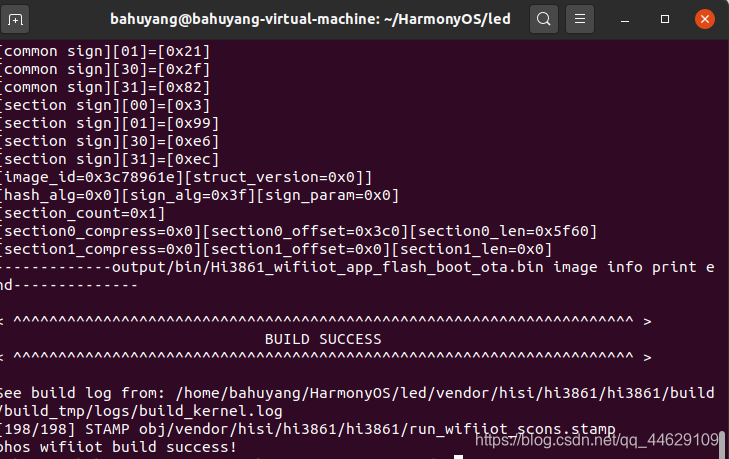

【HarmonyOS HiSpark Wi-Fi IoT 套件试用连载】LED灯闪烁
描述
本文来源电子发烧友社区,作者:跋扈洋, 帖子地址:https://bbs.elecfans.com/jishu_2006813_1_1.html
LED灯闪烁(开发板体验视频,详见作者原文章链接)
本例程:在app下新增业务led,其中led.c为业务代码,BUILD.gn为编译脚本,具体规划目录结构如下:
- .
- └── applications
- └── sample
- └── wifi-iot
- └── app
- │── led
- │ │── led.c
- │ └── BUILD.gn
- └── BUILD.gn

业务代码。
新建./applications/sample/wifi-iot/app/led下的led.c文件,在led.c中新建业务入口函数led,并实现业务逻辑。并在代码最下方,使用HarmonyOS启动恢复模块接口SYS_RUN()启动业务。(SYS_RUN定义在ohos_init.h文件中)
- BUILD.gn为编译脚本
- led.c为业务逻辑代码所在文件
- [indent]
- #include
- #include
- #include "ohos_init.h"
- #include "cmsis_os2.h"
- #include "wifiiot_gpio.h"
- #include "wifiiot_gpio_ex.h"
- #define LED_ON_TIME_US 2000000
- #define LED_OFF_TIME_US 1000000
- static void Led(void)
- {
- GpioInit();
- IoSetFunc(WIFI_IOT_IO_NAME_GPIO_9, WIFI_IOT_IO_FUNC_GPIO_9_GPIO);
- GpioSetDir(WIFI_IOT_IO_NAME_GPIO_9, WIFI_IOT_GPIO_DIR_OUT);
- while (1) {
- GpioSetOutputVal(WIFI_IOT_IO_NAME_GPIO_9, 0);
- printf("[DEMO] LED on.n");
- usleep(LED_ON_TIME_US);
- GpioSetOutputVal(WIFI_IOT_IO_NAME_GPIO_9, 1);
- printf("[DEMO] LED off.n");
- usleep(LED_OFF_TIME_US);
- }
- }
- SYS_RUN(Led);
- [/indent]
static_library("bahuyang") {sources = ["led.c"include_dirs = ["//utils/native/lite/include","//kernel/liteos_m/components/cmsis/2.0","//base/iot_hardware/interfaces/kits/wifiiot_lite",}
- “bahuyang”:是生成静态库名称,可随意更改
- “led.c”:代码文件
# Copyright (c) 2020 Huawei Device Co., Ltd.# Licensed under the Apache License, Version 2.0 (the "License");# you may not use this file except in compliance with the License.# You may obtain a copy of the License at## http://www.apache.org/licenses/LICENSE-2.0## Unless required by applicable law or agreed to in writing, software# distributed under the License is distributed on an "AS IS" BASIS,# WITHOUT WARRANTIES OR CONDITIONS OF ANY KIND, either express or implied.# See the License for the specific language governing permissions and# limitations under the License.import("//build/lite/config/component/lite_component.gni")import("//build/lite/config/component/lite_component.gni")lite_component("app") {features = [#"startup","led:bahuyang"}
- 将"startup"注释,运行我们自己的文件
- “led”:工程目录
- bahuyang:静态库文件
我在以前的文章里,详细讲解了怎样编译。大家可以回头看看。
我们进入终端面板下,在对应工程目录下,输入python build.py wifiiot
进行编译,当出现编译成功时,就代表编译完成。

烧录利用HiBurn工具进行烧录,我在以前的文章里,详细讲过。

选定文件后,点击connect,按下开发板复位按钮,进行烧录。
烧录完成后,再次按下复位按键。
观察现象
如视频中所示,LED灯进行闪烁。
声明:本文内容及配图由入驻作者撰写或者入驻合作网站授权转载。文章观点仅代表作者本人,不代表电子发烧友网立场。文章及其配图仅供工程师学习之用,如有内容侵权或者其他违规问题,请联系本站处理。
举报投诉
-
【HarmonyOS HiSpark Wi-Fi IoT 套件试用连载】播放音乐2022-10-31 1630
-
【HarmonyOS HiSpark Wi-Fi IoT 智能家居套件体验 】HarmonyOS HiSpark Wi-Fi IoT介绍+第一印象2022-06-25 5474
-
【HarmonyOS HiSpark Wi-Fi IoT 套件试用连载】CHAPTER 1 ---- 开箱报告2020-12-31 2622
-
【HarmonyOS HiSpark Wi-Fi IoT 套件试用连载】开发套件初探2020-11-22 2617
-
[HarmonyOS HiSpark Wi-Fi IoT HarmonyOS 智能家居套件]试用报告2020-11-16 2338
-
【HarmonyOS HiSpark Wi-Fi IoT 套件试用连载】LED灯闪烁2020-11-09 1329
-
【HarmonyOS HiSpark Wi-Fi IoT 套件试用连载】2-从DEMO中学习代码与控制2020-11-07 3642
-
【HarmonyOS HiSpark Wi-Fi IoT HarmonyOS 智能家居套件试用 】基于HiSpark Wi-Fi IoT HarmonyOS 智能家居套件的温控面板2020-10-29 2039
-
【HarmonyOS HiSpark Wi-Fi IoT套件】群英荟萃,Hi3861开发板开箱大盘点2020-10-27 2390
-
【HarmonyOS HiSpark Wi-Fi IoT 套件试用连连载】开箱报告2020-09-29 1729
-
【HarmonyOS HiSpark Wi-Fi IoT HarmonyOS 智能家居套件试用 】智能门禁系统2020-09-25 1141
全部0条评论

快来发表一下你的评论吧 !

